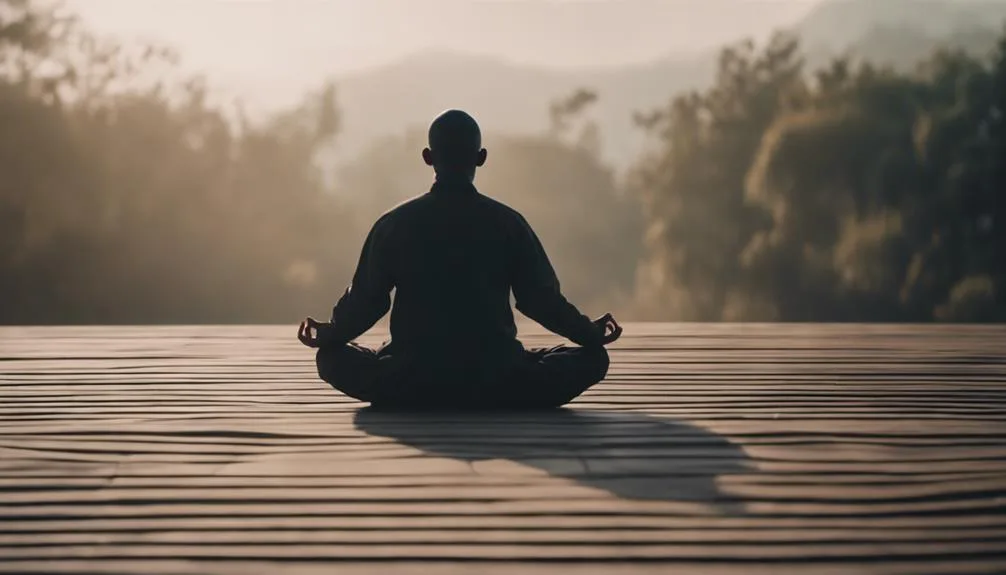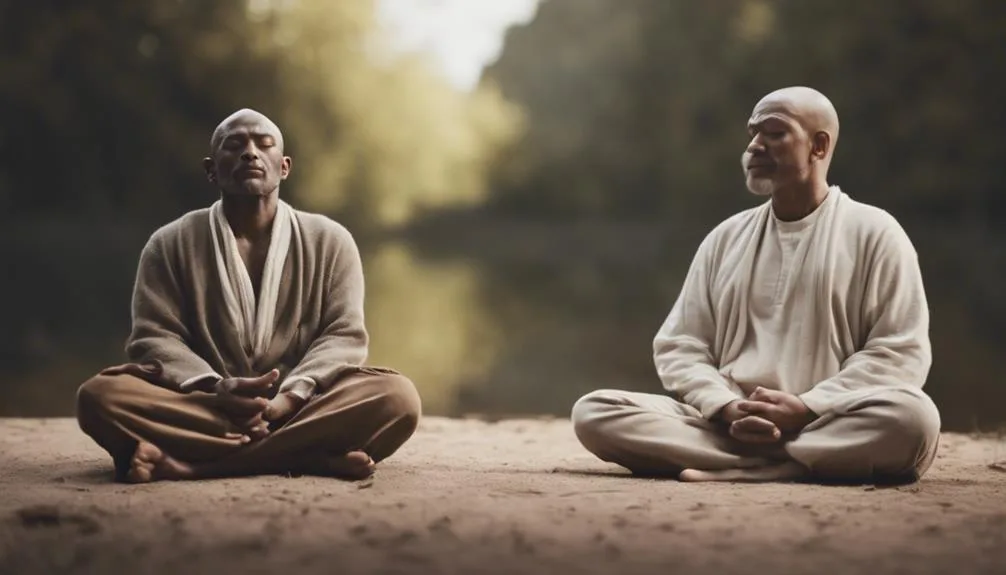In the realm of introspection and mindfulness, contemplation and meditation emerge as two distinct yet interconnected avenues towards inner understanding and self-discovery.
Examining the contrasts between these contemplative practices reveals a fascinating interplay of methodologies and goals. While meditation emphasizes the release of mental clutter through nonjudgmental observation, contemplation delves into analytical reflection to unravel the complexities of thoughts and concepts.
By exploring the intricate landscapes of contemplation and meditation, this discussion seeks to shed light on their unique roles in guiding individuals towards deeper insights and mental clarity.
Key Takeaways
- Contemplation involves analytical thinking, while meditation focuses on clearing the mind.
- Contemplation allows for deep exploration of ideas, contrasting with meditation's nonjudgmental awareness.
- Contemplative practices like journaling and reflective thinking distinguish contemplation from meditation.
- Religious contexts often use contemplation for deep reflection, while meditation aims for mindfulness and awareness.
Key Contrasts Between Contemplation and Meditation
In unraveling the distinctions between contemplation and meditation, a profound understanding of their unique qualities emerges, illuminating paths to introspection and serenity. Contemplation involves analytical reflection, encouraging deep thinking and exploration of ideas. It allows individuals to delve into topics, fostering a deeper understanding through mindful awareness.
On the other hand, meditation focuses on mindful awareness and cultivating a nonjudgmental perspective. It aims to clear the mind of distractions, promoting a sense of calm and focus. While contemplation involves methods like journaling, reflecting, and silent prayer, meditation utilizes techniques such as awareness and concentration.
Both practices offer valuable tools for self-discovery and growth, each contributing distinct benefits to one's journey of introspection and mindfulness.
Understanding Contemplation and Meditation
Through the practice of contemplation and meditation, individuals embark on a profound journey of self-discovery and inner peace. Analytical reflection allows for a deep dive into thoughts and ideas, fostering a greater understanding of oneself and the world.
Mindful awareness brings a sense of presence and connection, leading to a heightened sense of clarity and peace within. Reflecting on one's experiences with a compassionate lens can evoke feelings of gratitude, empathy, and serenity, enriching the practice of contemplation and meditation.
This introspective journey enables individuals to cultivate a harmonious balance between mind, body, and spirit, fostering personal growth and spiritual well-being. By embracing these practices with an open heart and mind, one can unlock the transformative power of contemplation and meditation.
Religious and Secular Perspectives on Contemplation

Contemplation, whether viewed through a religious or secular lens, offers individuals a profound opportunity for introspective exploration and spiritual growth. The religious perspective often intertwines contemplation with deep reflection, allowing individuals to explore the implications of ideas in a spiritual context. This can involve practices like silent reflection, contemplative prayer, or engaging in rituals such as Lectio Divina.
On the other hand, the secular approach to contemplation focuses on understanding concepts or thoughts deeply without necessarily involving religious elements. Both religious and secular perspectives on contemplation aim to facilitate spiritual growth, albeit through different avenues, providing individuals with a space for introspection and the opportunity to delve into the depths of their inner selves.
Exploring Contemplative Practices
Embarking on a journey of introspection and spiritual growth, individuals can delve into various contemplative practices to deepen their understanding of themselves and the world around them.
Emotions Evoked:
- Peace: Discovering inner tranquility through reflective exploration.
- Clarity: Journaling insights to untangle the complexities of the mind.
- Connection: Engaging in contemplative practices to foster a deeper connection with one's spiritual essence.
Contemplative practices like journaling insights and engaging in reflective exploration offer a pathway to unravel the layers of the self and gain profound insights. Through these methods, individuals can navigate the depths of their thoughts, emotions, and beliefs, paving the way for personal growth and spiritual enlightenment.
Comparing Benefits of Contemplation and Meditation

In the pursuit of inner peace and self-awareness, understanding the distinctive benefits of contemplation and meditation can illuminate the path towards spiritual growth and emotional well-being.
Contemplation nurtures deep understanding and mental clarity through mindful reflection on concepts or thoughts, aiding in unraveling complexities and fostering a profound connection with oneself. It allows for analytical exploration, encouraging individuals to delve into ideas with a focused and insightful approach.
On the other hand, meditation cultivates inner peace and mental clarity by quieting the mind and promoting nonjudgmental awareness. Through practices like sitting silently and focusing on breath, meditation enables individuals to let go of distractions and negative thoughts, leading to a clearer and more tranquil state of being.
Integrating Contemplation and Meditation in Daily Life
Integrating contemplative practices and meditation into daily life invites a harmonious blend of reflective depth and inner calmness, fostering a holistic approach to self-awareness and emotional well-being.
Engaging in mindful reflection and daily practice can significantly enhance one's inner peace and spiritual growth, leading to a more profound connection with oneself and the world around them.
By dedicating time each day to contemplation and meditation, individuals can cultivate a sense of tranquility and clarity that permeates their interactions and decisions.
This integration allows for a deeper understanding of one's thoughts and emotions, paving the way for personal growth and a greater sense of fulfillment in daily life.
Frequently Asked Questions
Can Contemplation and Meditation Be Practiced Simultaneously, or Is It More Effective to Focus on One at a Time?
Engaging in dual practice of contemplation and meditation can enhance individual benefits by nurturing the mind-body connection and fostering simultaneous growth. While focusing on one at a time can deepen understanding, integrating both practices offers holistic development.
Are There Any Specific Cultural or Historical Influences That Have Shaped the Practices of Contemplation and Meditation?
Cultural influences and historical contexts have deeply shaped contemplation and meditation practices. Understanding these influences can provide insight into the evolution and significance of these practices across different societies, offering a rich tapestry of wisdom and tradition.
How Does the Concept of Mindfulness Play a Role in Both Contemplation and Meditation Practices?
Mindfulness enhances both contemplation and meditation. In contemplation, it deepens understanding of concepts, fostering introspection. In meditation, mindfulness improves focus and awareness, aiding in letting go of distractions. Each practice benefits uniquely from the application of mindfulness techniques.
Are There Any Potential Risks or Challenges Associated With Engaging in Contemplative or Meditative Practices?
Engaging in contemplative or meditative practices can pose challenges such as emotional overwhelm or spiritual bypassing. Balancing these practices requires self-awareness and guidance. A study found that 30% of practitioners faced difficulties, emphasizing the importance of support.
How Do Different Personality Types or Learning Styles Impact the Effectiveness of Contemplation and Meditation Techniques?
Personality types and learning styles influence the efficacy of contemplation and meditation techniques. Tailoring practices to suit individual preferences fosters better engagement and understanding. By recognizing these differences, individuals can optimize their spiritual and cognitive growth.
Conclusion
In the intricate tapestry of contemplation and meditation, the contrasts between analytical thinking and nonjudgmental awareness are vividly displayed. As we navigate these contemplative practices, we uncover the depths of our inner selves and cultivate a profound understanding of the world around us.
Just as a sculptor chisels away at a block of marble to reveal a masterpiece within, so too do these practices chip away at the layers of our minds to unveil the beauty of inner peace and mental clarity.

